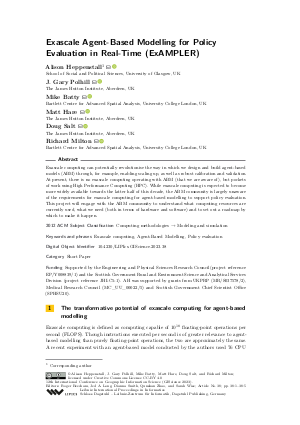Exascale Agent-Based Modelling for Policy Evaluation in Real-Time (ExAMPLER) (Short Paper)
Authors
Alison Heppenstall  ,
J. Gary Polhill
,
J. Gary Polhill  ,
Mike Batty
,
Mike Batty  ,
Matt Hare
,
Matt Hare  ,
Doug Salt
,
Doug Salt  ,
Richard Milton
,
Richard Milton 
-
Part of:
Volume:
12th International Conference on Geographic Information Science (GIScience 2023)
Part of: Series: Leibniz International Proceedings in Informatics (LIPIcs)
Part of: Conference: International Conference on Geographic Information Science (GIScience) - License:
 Creative Commons Attribution 4.0 International license
Creative Commons Attribution 4.0 International license
- Publication Date: 2023-09-07
File

PDF
LIPIcs.GIScience.2023.38.pdf
- Filesize: 0.55 MB
- 5 pages
Document Identifiers
Subject Classification
ACM Subject Classification
- Computing methodologies → Modeling and simulation
Keywords
- Exascale computing
- Agent-Based Modelling
- Policy evaluation
Metrics
- Access Statistics
-
Total Accesses (updated on a weekly basis)
0PDF Downloads0Metadata Views
Abstract
Exascale computing can potentially revolutionise the way in which we design and build agent-based models (ABM) through, for example, enabling scaling up, as well as robust calibration and validation. At present, there is no exascale computing operating with ABM (that we are aware of), but pockets of work using High Performance Computing (HPC). While exascale computing is expected to become more widely available towards the latter half of this decade, the ABM community is largely unaware of the requirements for exascale computing for agent-based modelling to support policy evaluation. This project will engage with the ABM community to understand what computing resources are currently used, what we need (both in terms of hardware and software) and to set out a roadmap by which to make it happen.
Cite As Get BibTex
Alison Heppenstall, J. Gary Polhill, Mike Batty, Matt Hare, Doug Salt, and Richard Milton. Exascale Agent-Based Modelling for Policy Evaluation in Real-Time (ExAMPLER) (Short Paper). In 12th International Conference on Geographic Information Science (GIScience 2023). Leibniz International Proceedings in Informatics (LIPIcs), Volume 277, pp. 38:1-38:5, Schloss Dagstuhl – Leibniz-Zentrum für Informatik (2023)
https://doi.org/10.4230/LIPIcs.GIScience.2023.38
BibTex
@InProceedings{heppenstall_et_al:LIPIcs.GIScience.2023.38,
author = {Heppenstall, Alison and Polhill, J. Gary and Batty, Mike and Hare, Matt and Salt, Doug and Milton, Richard},
title = {{Exascale Agent-Based Modelling for Policy Evaluation in Real-Time (ExAMPLER)}},
booktitle = {12th International Conference on Geographic Information Science (GIScience 2023)},
pages = {38:1--38:5},
series = {Leibniz International Proceedings in Informatics (LIPIcs)},
ISBN = {978-3-95977-288-4},
ISSN = {1868-8969},
year = {2023},
volume = {277},
editor = {Beecham, Roger and Long, Jed A. and Smith, Dianna and Zhao, Qunshan and Wise, Sarah},
publisher = {Schloss Dagstuhl -- Leibniz-Zentrum f{\"u}r Informatik},
address = {Dagstuhl, Germany},
URL = {https://drops.dagstuhl.de/entities/document/10.4230/LIPIcs.GIScience.2023.38},
URN = {urn:nbn:de:0030-drops-189334},
doi = {10.4230/LIPIcs.GIScience.2023.38},
annote = {Keywords: Exascale computing, Agent-Based Modelling, Policy evaluation}
}
Author Details
Funding
Supported by the Engineering and Physical Sciences Research Council(project reference EP/Y008839/1) and the Scottish Government Rural and Environment Science and Analytical Services Division (project reference JHI-C5-1). AH was supported by grants from UKPRP (MR/S037578/2), Medical Research Council (MC_UU_00022/5) and Scottish Government Chief Scientist Office (SPHSU20).
References
- Lilian Na Alessa, Melinda Laituri, and Michael Barton. An "all hands" call to the social science community: Establishing a community framework for complexity modeling using agent based models and cyberinfrastructure. Journal of Artificial Societies and Social Simulation, 9(4):6, 2006. URL: https://www.jasss.org/9/4/6.html.
- Li An, Volker Grimm, and Billie L. Turner II. Editorial: Meeting grand challenges in agent-based models. Journal of Artificial Societies and Social Simulation, 23(1):13, 2020. URL: https://doi.org/10.18564/jasss.4012.
- Jennifer Badham, Pete Barbrook-Johnson, Camila Caiado, and Brian Castellani. Justified stories with agent-based modelling for local COVID-19 planning. Journal of Artificial Societies and Social Simulation, 24(1):8, 2021. URL: https://doi.org/10.18564/jasss.4532.
-
Stephen W. Hawking. A Brief History of Time: From the Big Bang to Black Holes. Bantam Press, London, UK, 1988.

- Gary Polhill. Antisocial simulation: using shared high-performance computing clusters to run agent-based models. Review of Artificial Societies and Social Simulation, 14 December 2022, 2022. URL: https://rofasss.org/2022/12/14/antisoc-sim/.
- Flaminio Squazzoni, Gary Polhill, Bruce Edmonds, Petra Ahrweiler, Patrycja Antosz, Geeske Scholz, Émile Chappin, Melania Borit, Harko Verhagen, Francesca Giardini, and Nigel Gilbert. Computational models that matter during a global pandemic outbreak: A call to action. Journal of Artificial Societies and Social Simulation, 23(2):10, 2020. URL: https://doi.org/10.18564/jasss.4298.
- Jason Thompson, Rod McClure, Tony Blakely, Nick Wilson, Michael G. Baker, Jasper S. Wijnands, Thiago Herick De Sa, Kerry Nice, Camilo Cruz, and Mark Stevenson. Modelling SARS‐CoV‐2 disease progression in Australia and New Zealand: an account of an agent‐based approach to support public health decision‐making. Australian and New Zealand Journal of Public Health, 46(3):292-303, 2022. URL: https://doi.org/10.1111/1753-6405.13221.
